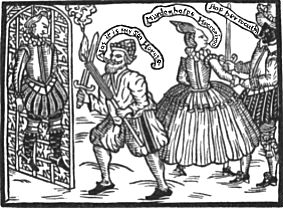Thomas Kyd
One of the most popular plays of the whole period covered by Shakespeare's career was The Spanish Tragedy, probably by Thomas Kyd*. Kyd startles with spectacular stage devices adopted from Senecan drama:
- There is a ghost which urges on the figure of Revenge, in a manner roughly similar to the beginning of Seneca's Thyestes, where the ghost of Tantalus and a Fury exclaim upon the horrific doom which is about to destroy Tantalus' family. . .
Senecan Irony?
- There is tragic irony in abundance, particularly in the final scene where the King of Spain and the Viceroy of Portugal witness a play-within-the-play (The Spanish Tragedy was written before A Midsummer Night's Dream or Hamlet); the onlookers think that the acting of their nephew and son is particularly good in their deaths, but discover that the stabbings are in earnest.
More horrors
- There are other Senecan horrors, the only real difference being that in Kyd's play they take place on stage rather than being reported by the nuntius ("messenger").
Fine speeches
- And there are stately speeches, full of contrived and heightened rhetoric. Hieronymo, after the murder of his son, laments:
O eyes, no eyes, but fountains fraught with tears;
O life, no life, but lively form of death;
O world, no world, but mass of public wrongs,
Confused and filled with murder and misdeeds.
O sacred heavens! If this unhallowed deed,
If this inhuman and barbarous attempt,
If this incomparable murder thus
Of mine, but now no more my son,
Shall unrevealed and unrevenged pass,
How should we term your dealings to be just,
If you unjustly deal with those that in your Justice trust*?
(3. 2. 1-11)
In its bombastic way, the speech is not much different from the turgid rhetoric of the "Pyrrhus" speech in Hamlet (2. 2 459-525).
Footnotes
-
No-one to trust
The irony of this speech lies in part in the fact that Hieronymo is Marshal of Spain, responsible for the administration of justice in the country, yet he is unable to obtain justice for himself.
-
Thomas Kyd (1558-1594)
As is so often the case with writers of the period, little is known of Kyd's life--and indeed the only way we know that his most famous play, The Spanish Tragedy, was by him is from a reference in a contemporary pamphlet. Robert Greene may have intended to include Kyd in his attack on uneducated playwrights.
